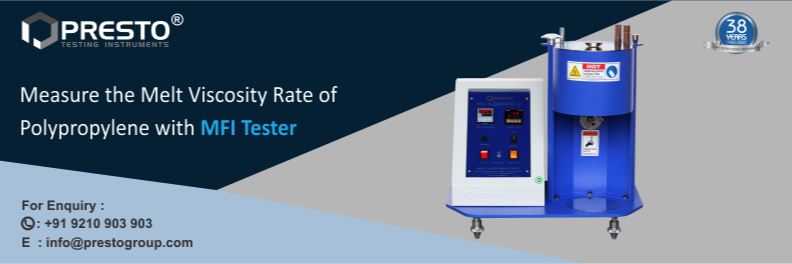

In the plastic manufacturing industries, there are many properties of polypropylene that are essential to measure the quality of the products. The physical, chemical and mechanical attributes of the polymers have a significant impact on the strength and durability of the products due to various ecological factors.
Factor Affecting Viscosity of Plastics
The major factor that helps to analyze the MFR of the plastic resins is the Melt Flow Index or Melt Viscosity Rate of the plastics. Determining the Melt Flow Index of Polypropylene can be analyzed only when they are placed in its molten state. This directly indicates the molecular weight of the polymers and adversely proportional to the rate of melt flow. The lower the MFR of the polypropylene, the complex will be its molecular structure and on the other hand, higher the MFR of the polymers simpler will be its molecular structure. MFI tester is used to measure the accurate MFI rate of the polymers with an ease.
Solution to Measure the MFR of Plastics
Presto Stantest offers a broad range of melt flow index testers that strictly adhere to national and international standard test methods. Presto Stantest manufactures two models of MFI tester i.e. Deluxe Model and NXG model to calculate the Melt Flow Index of Polypropylene. The testing machines are designed on the heavy metallic base plate and finished with the autumn grey and blue color plating that provide an elegant finish to the instrument. The testing machine offers highly stable and reliable test results.
Examine The Flow Of Melted Polymers With MFI Tester
Measure The Viscosity Of Melted Polymers With Melt Flow Index of Plastics
Related Blogs

A Tensile Tester is designed to pull a material sample until it breaks. It helps engineers measure important properties like tensile strength, elongation at break, yield point, and more.

UV Chamber simulates sunlight to test material durability against UV rays, helping ensure long-term quality and resistance to environmental damage.

Salt spray test checks corrosion resistance of materials using a salt spray chamber. Essential for quality control in coatings, metals, and finishes.